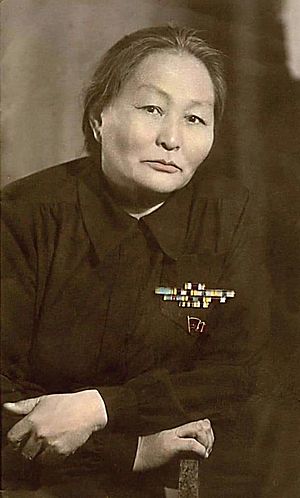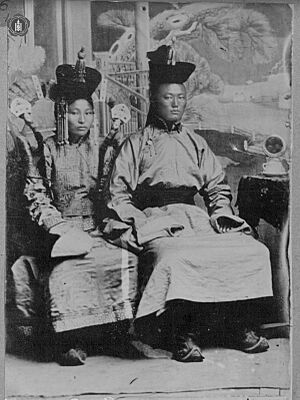Sükhbaataryn Yanjmaa facts for kids
Quick facts for kids
Sükhbaataryn Yanjmaa
Сүхбаатарын Янжмаа |
|
|---|---|
 |
|
| Chairwoman of the Presidium of the State Great Khural | |
|
Acting
|
|
| In office 7 September 1953 – 7 July 1954 |
|
| Prime Minister | Yumjaagiin Tsedenbal |
| Preceded by | Gonchigiin Bumtsend |
| Succeeded by | Jamsrangiin Sambuu |
| Personal details | |
| Born | 15 February 1893 Khüree, Mongolia, Qing China |
| Died | 1 May 1962 (aged 69) Ulaanbaatar, Mongolian People's Republic |
| Political party | Mongolian People's Revolutionary Party |
| Spouse | Damdin Sükhbaatar |
Sükhbaataryn Yanjmaa (Mongolian: Сүхбаатарын Янжмаа, born Nemendeyen Yanjmaa; 15 February 1893 – 1 May 1962) was an important Mongolian politician. She became the second woman in history to be a non-hereditary head of state, meaning she was chosen for the role, not born into it. The first was Khertek Anchimaa-Toka from Tannu Tuva. Yanjmaa was the first woman to hold such a high position in a fully independent country. She was also the wife of Damdin Sükhbaatar, a famous Mongolian revolutionary leader.
Contents
Early Life and Revolution
Yanjmaa was born on February 15, 1893. She grew up in a poor family that raised animals near what is now Ulaanbaatar, the capital of Mongolia.
Joining the Revolution
In 1919, Yanjmaa started working for Sükhbaatar's revolutionary group. She helped by carrying messages for them. In 1920, her husband traveled to the Soviet Union to connect with other revolutionaries. Yanjmaa stayed in Ulaanbaatar with their son. She had to hide from Chinese officials who were looking for people involved in the revolution.
In 1921, Khorloogiin Choibalsan helped Yanjmaa and her son escape to a town called Kyakhta. There, they were able to reunite with Sükhbaatar.
After her husband led Mongolian fighters to victory in the Outer Mongolian Revolution of 1921, Yanjmaa became a member of the Mongolian Revolutionary Youth League. This was a youth group that supported the revolution.
A Leader in Politics
When Sükhbaatar died in 1923, Yanjmaa changed her name to "Sükhbaataryn" to honor him. A year later, in 1924, she joined the Mongolian People's Revolutionary Party (MPRP). This was the main political party in Mongolia.
Yanjmaa quickly became an important member of the party's leadership. She represented the MPRP at big international meetings in Moscow in 1924. There, she met other important women leaders like Clara Zetkin and Nadezhda Krupskaya. In 1925, she helped create Mongolia's first trade union, which supported workers' rights.
From 1927 to 1930, Yanjmaa studied at a special university in Moscow called the Communist University of the Toilers of the East. In 1933, she started leading a new women's section within the MPRP. Her main goal was to improve education for women.
International Connections
From 1940 to 1954, Yanjmaa was part of the MPRP's top political group, the politburo. She also served as the Secretary of the party's Central Committee from 1941 to 1947. She was a member of the Presidium of the Little Khural, which was an executive part of the Mongolian Parliament, from 1940 to 1950.
During World War II, Yanjmaa helped raise money to support the Soviet Union. For her efforts, she received a special award from the Soviet Union in 1946 called the Order of the Red Banner of Labour. In 1945, she was chosen to be a member of the Women's International Democratic Federation (WIDF), an international group focused on women's rights.
Becoming Head of State
Yanjmaa was a member of the People's Great Khural, Mongolia's main parliament, from 1950 to 1962. After the death of Gonchigiin Bumtsend, she became the temporary leader of Mongolia. This happened from September 23, 1953, until July 8, 1954. This made her the second woman to be a formal head of state of a republic, after Khertek Anchimaa-Toka in the Tuvan People's Republic.
Images for kids
-
Https://persons-info.com/userfiles/image/persons/10000-20000/10000-11000/10397/SUKHE-BATOR Damdiny 11.jpg
Yanjmaa (left) with her son, October 1939
-
Https://ic.pics.livejournal.com/dambiev/74651708/1590692/1590692 original.jpg
Yanjmaa (right) on a military parade in Mongolia, 1954
See also
 In Spanish: Sühbaataryn Yanjmaa para niños
In Spanish: Sühbaataryn Yanjmaa para niños
 | Selma Burke |
 | Pauline Powell Burns |
 | Frederick J. Brown |
 | Robert Blackburn |


